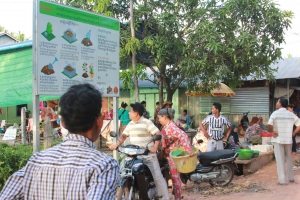Improving waste management in Toul Toueng Commune, Cambodia
Location: Toul Toueng Commune, Cambodia. 31st May 2017
Without proper disposal and treatment, contaminants from solid waste can leach into soils and nearby water sources. These contaminants often find their way into freshwater and marine ecosystems, threatening critical food and water resources as well as the health and biodiversity of these ecosystems.
The city of Sihanoukville, a growing tourist destination on Cambodia’s coast, only has a single landfill and no facilities for processing waste or recycling that can handle the growing waste management demand.
Improper garbage disposal close to the Chompu Khmao Village © Center for Biodiversity Conservation of the Royal University of Phnom Penh
Due to a lack of proper waste disposal awareness or mechanisms for waste removal, people from the Toul Toeteung commune often dispose of waste in the canals, which is then washed down stream. "Most waste that you find in Chompou Khmao Village comes from upstream residents and the Prey Nob market. They dispose of their waste into the canal and it ends up here,” explains a local resident from the commune. “We cannot use the water and villagers suffer a lot from this waste."
In 2016, the CBC team held discussions with commune community members and local officials to raise awareness about the benefits of reducing waste. Through these discussions, the decision was made to install signs throughout the commune in order to raise awareness about the detrimental effects of improper waste disposal.
Promotional signboard on proper waste management installed in front of a secondary school in the Toul Toueng Commune © Center for Biodiversity Conservation of the Royal University of Phnom Penh
Mr Sophea, a project officer at CBC, emphasised that “an individual person can contribute to reducing waste by purchasing products that are not excessively packaged and buying only necessary products.”
Efforts to reduce waste and re-use products that would otherwise be thrown out will be combined with the operation of a waste incinerator, provided by CBC, to reduce the plethora of solid waste making its way into the waterways and nearby marine ecosystems. Even though waste incinerators can have negative impacts on air quality and carbon emissions, CBC decided to provide the incinerator after community members agreed to adhere to a strict set of recommendations to minimise those impacts.
CBC also conducted a workshop in September 2016 to teach locals how to use organic waste for creating nutrient-rich compost that can help improve agricultural yields. "This is the first time [I have had training on waste management] and it is interesting to learn the ways that we can benefit from our waste by practising composting and recycling,” remarked Ms You Samat, a member of the commune council.
During this process, CBC has found that through community cooperation, raising awareness on waste disposal hazards and changing daily behaviours, community members can benefit from an increased quality of life, improved water quality and healthier ecosystems at minimal cost.

Promotional signboard on how to produce natural composts fro ... © © Center for Biodiversity Conservation of the Royal University of Phnom Penh